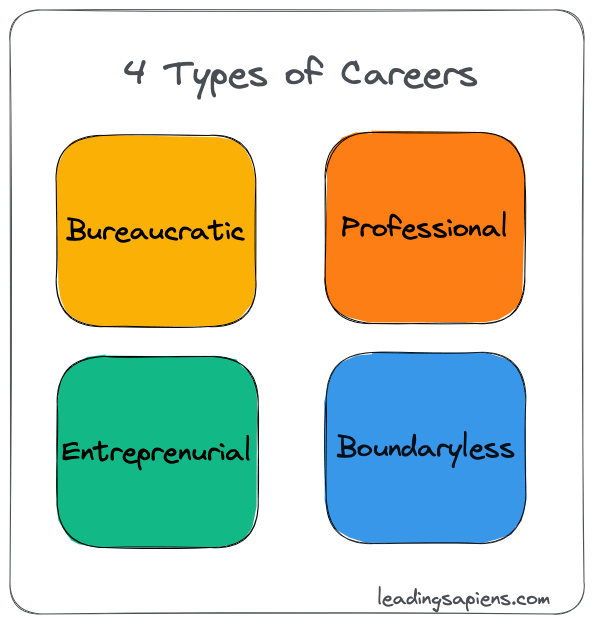In their book Coaching with Colleagues, Erik de Haan and Yvonne Burger identify four common but prominent career patterns:
• The bureaucratic career entails moves from rank to rank and job to job in a succession of hierarchical positions. In this pattern, people are not particularly attached to specific tasks or colleagues, but are often very loyal to the organization as a whole. Progress in this career is vertical — the only way is up! If progress stagnates it is usually because the person concerned does not understand the rules of the game, or does not apply them properly.
• The entrepreneurial career is focused on entrepreneurship. In this script, professionals are entrepreneurial, creative, innovative and competitive. Once they have found their niche, they stay there. The more commercial success, the more income. Progress in this career is strongly linked to the extent to which someone is able to create new products or services. Progress stagnates when the business is not prepared to (continue to) grow.
• The professional career is a career based on expertise. The person concerned acquires status and reputation by excelling in professional knowledge and skills, for example in academia. The professional is very loyal to his or her specialism, but less so to the organisation. Progress is assessed in terms of an individual’s response to increasingly demanding assignments. It stagnates when the professional notices, too late, that his or her specialism is no longer necessary and fails to develop a new specialism in time.
• The boundaryless career has no standardised script. Professionals write their own script while working on projects – often in a self-employed capacity or in temporary networks. They create progress by continually developing new things, both in terms of form and content, and by renewing their own network. Each new project brings a new challenge. Progress in this career takes place when the person concerned feels ready to take on increasingly complex and uncertain assignments. Progress stagnates if (s)he makes choices without carefully considering his or her own interests, or lacks market discipline, resilience and/or powers of recovery.
Each of these career types has its own set of learning barriers:
• In the bureaucratic career there is a risk of passive, risk-averse learning behavior and it is particularly difficult to develop accommodative learning.
• In the entrepreneurial career, the usual focus on action and objectives is at odds with the calm and reflection of divergent learning, in particular.
• In the professional career, there are already so many intrinsic, content challenges that these ‘knowledge workers’ sometimes do not take on extrinsic challenges and may have difficulty with application-oriented, convergent learning.
• In the boundaryless career there is a lot of experience of meta- learning, but professionals may be so exposed to fragmentation, discontinuity and an excess of information that confusion results, and systematic assimilative learning in particular becomes difficult.
Leadership and managerial effectiveness are very contextual. A manager who was successful in one context can be an abject failure in another one. Mismatch between our preferences and what a particular career type entails is a common stumbling block.
Henry Mintzberg put it this way in Managing:
Managers are not effective; matches are effective. There is no such thing as a good husband or a good wife, only a good couple. And so it is with managers and their units.
There may be people who fail in all managerial jobs, but there are none who can succeed in all of them. That is because a flaw that can be tolerable in one situation—indeed, be a positive quality—can prove fatal in another. It all depends on the match between the person and the context, at the time, for a time, so long as it lasts.
The trick is to figure out environments that are ideally suited for your own set of strengths, learning preferences and leadership styles, and making adjustments accordingly.
What career type are you currently in? Is it ideally suited for your talents and inclinations? What would an ideal scenario look like?
References
- Coaching with Colleagues by Erik de Haan and Yvonne Burger.
- Careers and the wealth of nations by Rosabeth Moss Kanter in Handbook of Career Theory.
- The boundaryless career: a new perspective for organizational inquiry by Michael B. Arthur in Journal of Organizational Behavior.
- Managing by Henry Mintzberg.


